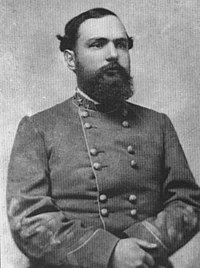W. H. F. Lee
William Henry Fitzhugh Lee | |
|---|---|
 | |
| Member of the U.S. House of Representatives from Virginia's 8th district | |
| In office March 4, 1887 – October 15, 1891 | |
| Preceded by | John S. Barbour, Jr. |
| Succeeded by | Elisha E. Meredith |
| Member of the Virginia Senate | |
| In office 1875–1878 | |
| Personal details | |
| Political party | Democratic |
| Spouse(s) | 1st Charlotte Wickham, 2nd Mary Tabb Bolling |
| Children | Robert Edward Lee, George Bolling Lee |
| Alma mater | Harvard University |
| Military service | |
| Branch/service | Confederate States Army |
| Rank | Major General |
| Battles/wars | American Civil War |
William Henry Fitzhugh Lee (May 31, 1837 – October 15, 1891), known as Rooney Lee or W.H.F. Lee, was the second son of Robert E. Lee and Mary Anna Randolph Custis. He was a planter, a Confederate cavalry General in the American Civil War, and later a member of the U.S. Congress.
Early life
Lee was born at Arlington House in Arlington, Virginia. He attended Harvard University, and then followed in his father's footsteps, entering the United States Army in 1857 as a second lieutenant. He served with the 6th U.S. Infantry under Albert Sidney Johnston, and participated in the Utah War against the Mormons. In 1859, he resigned from the U.S. Army to operate his White House Plantation, on the south shore of the Pamunkey River, in New Kent County, Virginia.
Civil War
With the outbreak of the Civil War Lee became a captain in the Confederate Army cavalry and was soon promoted to major. He initially served in western Virginia under the command of Brig. Gen. William Loring during 1861 and early 1862. He was then placed under the command of Maj. Gen. J.E.B. Stuart, becoming a lieutenant colonel, and later colonel of the 9th Virginia Cavalry.
After the Battle of South Mountain, Lee was promoted to brigadier general. He fought at Antietam under the command of Brig. Gen. Fitzhugh Lee, his cousin. He commanded the 3rd Brigade of Stuart's Cavalry Division at the Battles of Fredericksburg and Chancellorsville. He was wounded during combat at Brandy Station at the beginning of the Gettysburg Campaign and was captured by Union forces at Hickory Hill, Virginia, two weeks later, while recuperating. He was a prisoner of war in New York State until returned to the Confederate Army on February 25, 1864. To accomplish this he was exchanged for Confederate captive Union Brig. Gen. Neal S. Dow. In April, he was promoted to major general and commanded a division in the Cavalry Corps during the breakout from Petersburg and the retreat of his father's army in the Appomattox Campaign. By the end of the war, he had risen to second-in-command of the Confederate cavalry. He surrendered along with his father at Appomattox Court House.
Postbellum career
Lee returned to White House Plantation and planting after the war. Nearby, his younger brother Rob lived at Romancock Plantation across the river in King William County.
After his mother died in 1873, Rooney inherited Ravensworth Plantation, the old Fitzhugh family property (near present-day Springfield) in Fairfax County with 563 acres (2.28 km2) of land. He moved there from White House. In 1875 Rooney was elected to the Virginia Senate, serving until 1878. He was then elected as a Democrat to the United States House of Representatives in 1887. He served in the House until his death at Ravensworth in 1891. He is interred in the Lee Chapel at Washington and Lee University in Lexington, Virginia, with his parents and siblings.
Family
Lee married twice, first in 1859 to Charlotte Wickham, a descendant of attorney John Wickham. They had two children, a boy and a girl, both of whom died in infancy. Charlotte died in 1863.
On November 28, 1867, he married Mary Tabb Bolling, a descendant of Colonel Robert Bolling and Bolling's second wife Anne Stith. They had two children who lived to adulthood: Robert Edward Lee, born February 11, 1869, at Petersburg, and George Bolling Lee, born August 30, 1872, at Lexington.
Lee is the step-great-great-grandson of George Washington. Lee's mother, Mary Anna Randolph Custis Lee, was the great-granddaughter of Martha (Dandridge) Custis, who was a widow living at her White House Plantation in New Kent County (which Rooney Lee later inherited) when she was courted by Colonel George Washington before their marriage in 1759.
| Family of W. H. F. Lee | ||||||||||||||||||||||||||||||||||||||||||||||||||||||||||||||||||||||||||||||||||||||||||||||||||||||||||||||||||||||||||||||||||||||||||||||||||||||||||||||||||||||||||||||||||||||||||||||||||||||||||||||||||||||||||||||||||||||||||||||||||||||||||||||||||||||||||||||||||||||||||||||||||||||||||||||||||||||||||||||||||||||||||||||||||||||||||||||||||||||||||||||||||||||||||||||||||||||||||||||||||||||||||||||||||||||||||||||||||||||||||||||||||||||||||||||||||||||||||||||||||||||||||||||||||||||||||||||||||||||||||||||||||||||||||||||||||||||||||||||||||||||||||||||||||||||||||||||||
|---|---|---|---|---|---|---|---|---|---|---|---|---|---|---|---|---|---|---|---|---|---|---|---|---|---|---|---|---|---|---|---|---|---|---|---|---|---|---|---|---|---|---|---|---|---|---|---|---|---|---|---|---|---|---|---|---|---|---|---|---|---|---|---|---|---|---|---|---|---|---|---|---|---|---|---|---|---|---|---|---|---|---|---|---|---|---|---|---|---|---|---|---|---|---|---|---|---|---|---|---|---|---|---|---|---|---|---|---|---|---|---|---|---|---|---|---|---|---|---|---|---|---|---|---|---|---|---|---|---|---|---|---|---|---|---|---|---|---|---|---|---|---|---|---|---|---|---|---|---|---|---|---|---|---|---|---|---|---|---|---|---|---|---|---|---|---|---|---|---|---|---|---|---|---|---|---|---|---|---|---|---|---|---|---|---|---|---|---|---|---|---|---|---|---|---|---|---|---|---|---|---|---|---|---|---|---|---|---|---|---|---|---|---|---|---|---|---|---|---|---|---|---|---|---|---|---|---|---|---|---|---|---|---|---|---|---|---|---|---|---|---|---|---|---|---|---|---|---|---|---|---|---|---|---|---|---|---|---|---|---|---|---|---|---|---|---|---|---|---|---|---|---|---|---|---|---|---|---|---|---|---|---|---|---|---|---|---|---|---|---|---|---|---|---|---|---|---|---|---|---|---|---|---|---|---|---|---|---|---|---|---|---|---|---|---|---|---|---|---|---|---|---|---|---|---|---|---|---|---|---|---|---|---|---|---|---|---|---|---|---|---|---|---|---|---|---|---|---|---|---|---|---|---|---|---|---|---|---|---|---|---|---|---|---|---|---|---|---|---|---|---|---|---|---|---|---|---|---|---|---|---|---|---|---|---|---|---|---|---|---|---|---|---|---|---|---|---|---|---|---|---|---|---|---|---|---|---|---|---|---|---|---|---|---|---|---|---|---|---|---|---|---|---|---|---|---|---|---|---|---|---|---|---|---|---|---|---|---|---|---|---|---|---|---|---|---|---|---|---|---|---|---|---|---|---|---|---|---|---|---|---|---|---|---|---|---|---|---|---|---|---|---|---|---|---|---|---|---|---|---|---|---|---|---|---|---|---|---|---|---|---|---|---|---|---|---|---|---|---|---|---|---|---|---|---|---|---|---|---|---|---|---|---|---|---|---|---|---|---|---|---|---|---|---|---|---|---|---|---|---|---|---|---|---|---|---|---|---|---|---|---|---|---|---|---|---|---|---|---|---|---|---|---|---|---|---|---|---|---|---|---|---|---|---|---|---|---|---|---|---|---|---|---|---|---|---|---|---|---|---|---|---|---|---|---|---|---|---|---|---|---|---|
| ||||||||||||||||||||||||||||||||||||||||||||||||||||||||||||||||||||||||||||||||||||||||||||||||||||||||||||||||||||||||||||||||||||||||||||||||||||||||||||||||||||||||||||||||||||||||||||||||||||||||||||||||||||||||||||||||||||||||||||||||||||||||||||||||||||||||||||||||||||||||||||||||||||||||||||||||||||||||||||||||||||||||||||||||||||||||||||||||||||||||||||||||||||||||||||||||||||||||||||||||||||||||||||||||||||||||||||||||||||||||||||||||||||||||||||||||||||||||||||||||||||||||||||||||||||||||||||||||||||||||||||||||||||||||||||||||||||||||||||||||||||||||||||||||||||||||||||||||
References
- Eicher, John H., and David J. Eicher. Civil War High Commands. Stanford, CA: Stanford University Press, 2001. ISBN 0-8047-3641-3.
Further reading
- Freeman, Douglas S. R. E. Lee, A Biography. 4 vols. New York: Charles Scribner's Sons, 1934–35. OCLC 166632575.
- Longacre, Edward G. Lee's Cavalrymen: A History of the Mounted Forces of the Army of Northern Virginia. Mechanicsburg, PA: Stackpole Books, 2002. ISBN 0-8117-0898-5.
External links
- United States Congress. "W. H. F. Lee (id: L000208)". Biographical Directory of the United States Congress.
- 1837 births
- 1891 deaths
- Confederate States Army generals
- Harvard University alumni
- Virginia State Senators
- Members of the United States House of Representatives from Virginia
- People from Arlington, Virginia
- Custis family of Virginia
- Fitzhugh family of Virginia
- Lee family of Virginia
- Washington family
- People of Virginia in the American Civil War
- American Civil War prisoners of war
- American people of English descent
- 19th-century American Episcopalians
- Bolling family
- American planters
